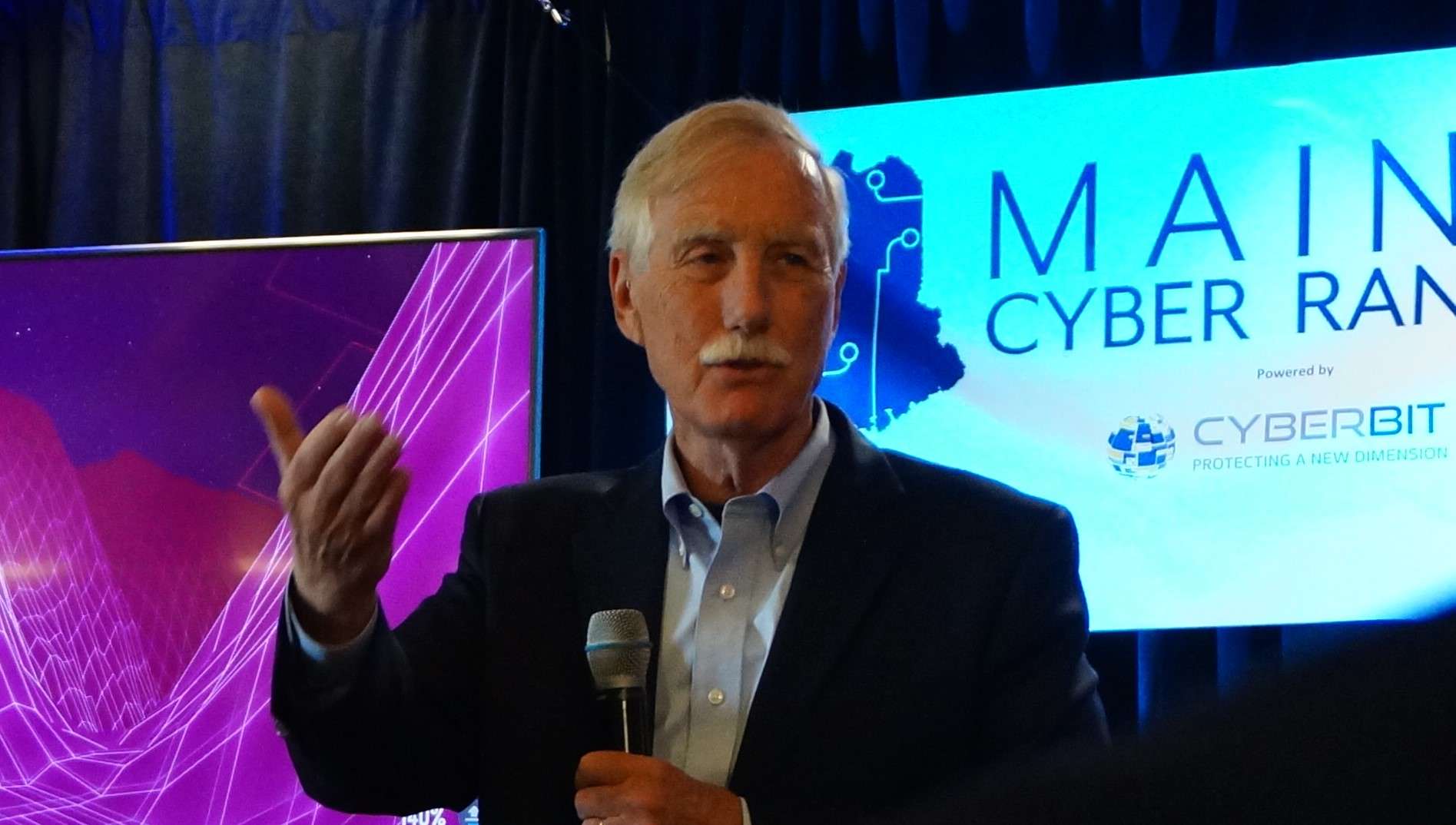
UMA's cybersecurity range makes state 'world leader'
The new Maine Cyber Range at the University of Maine in Augusta represents a giant step toward attacking "a new kind of crime" that "we're just learning to deal with," said U.S. Sen. Angus King, I-Maine, at the cyber training center's ribbon-cutting Friday.
The center will be available not only for students, but businesses and individuals, with the aim of getting ahead of fast-changing cyber threats and also filling hundreds of thousands of needed positions across the U.S.
"The opening of this training center continues UMA's mission of providing quality educational opportunities that help fill workforce needs with well-trained graduates for in-demand, highly skilled positions,” said Rebecca Wyke, UMA president. Businesses and organizations that use the range will also be able to advance the skills of current employees and enhance their cyber security efforts.
University of Maine System Chancellor Dannel Malloy told a room packed with stakeholders, officials and the curious Friday that creation of the center shows "a foresight and willingness to take chances."
"We have to change the equation," he said. "We have to graduate people, or certify people, with a different set of abilities," and that requires the everyday practice the center will provide.
"There's no bigger threat to democracy than the manipulation of information," he said.

'Maine's in the lead'
KIng, who's a member of the Senate Intelligence Committee, is also co-chair of the recently formed Cyberspace Solarium Commission, which aims to protect U.S. interests from hacking and cyber crime.
The cyber training center "is not something every college in America is doing," he told those gathered Friday. "I'm very excited that Maine's in the lead."
The students who are trained at the center will be the "first line of defense."
"This is an urgent national security issue," he said.
UMA partnered to create the range with CyberBit, a global firm that has offices in Israel, Texas, the U.K., India and Germany, and is a subsidiary of Elbit Systems, an international defense electronics company (Nasdaq: ESLT).
The licensing agreement with Cyberbit is $280,000 a year, with a three-year agreement. UMA plans to offset part of the cost through a fee structure for training offered to other universities, businesses and organizations.
"This is going to be a game-changer for the state of Maine, New England and beyond," said CyberBit COO Gilad Weitman. The range is the first CyberBit has helped develop in New England.
Weitman said it's not only a game-changer in what's available for cyber security training, but also for filling needed positions. He said the U.S. is short 300,000 cyber security professionals who are trained to respond to a modern attack, and at least 14,000 are needed in New England.
Most employers' cyber security teams aren't equipped to handle an attack. The Maine Cyber Range trains students and professionals "with the exact same tools as they would use at work," he said.
In a Center for Strategic and International Studies survey of IT decision makers across eight countries in January, 82% of employers reported a shortage of cybersecurity skills, and 71% believe the talent gap causes direct and measurable damage to their organizations.
CSIS reported that CyberSeek, an initiative funded by the National Initiative for Cybersecurity Education, found that the U.S. faced a shortfall of almost 314,000 cybersecurity professionals as of January. The country’s total employed cybersecurity workforce is 716,000, and the number of unfilled jobs has grown by more than 50% since 2015, according to CyberSeek. By 2022, the global cybersecurity workforce shortage has been projected to reach upwards of 1.8 million unfilled positions.
Cyberbit has 10 similar ranges in the U.S., Weitman said after the ribbon-cutting. Its first at a U.S. university was Regent University, in Virginia, in 2017.

UMA's fastest-growing program
Wyke said cybersecurity is the fastest-growing program at UMA, and the focus on the program, and, in particular, the cyber range, stemmed largely from the efforts of Henry Felch, an associate professor of cybersecurity and computer information systems.
"As soon as we develop a defense, a hacker finds something new," Felch said. The range will train students to apply what they've learned and rapidly adapt to changes.
He said it opens a new opportunity for students, many of whom take cyber courses online. The university's 248 cybersecurity program students are from 23 states and two countries besides the U.S. "They're a very diverse group," Felch said.
UMA offers a bachelor of science in cybersecurity program, which was awarded the National Center of Academic Excellence in Cyber Defense designation from the National Security Agency and the Department of Homeland Security.
Beginning with the coming semester, a certificate of graduate study in cybersecurity online course will be offered jointly by UMA and the University of Southern Maine, which is opening a Center for Digital Science and Innovation.

A new way to fight crime
King said cyber attacks require a form of crime prevention that is new and difficult to strategize for. Cyber hacking is also cheap.
"[Russian President Vladimir] Putin can hire 4,000 hackers for the cost of one jet aircraft," he said.
The criminals can be anywhere in the world. "You can't cut off their wifi, you can't cut off their TV signal," King said.
Friday, those attending the program got a chance to try out the system, clicking on an email like to "check out a cool movie," then identify who had clicked the bad link and where the damage was.
King said earlier, "The best defense is for people to learn it's happening."
"We still open emails that say 'You're not going to believe this!'," he said. "We need to get to a higher level of digital literacy."
He said that on a global scale, governments are working on international norms and standards to create "a kind of Geneva convention for cybersecurity."
Beyond that, though, he said, the U.S. has to find a way to protect itself. "And it's happening right here at UMA."














0 Comments